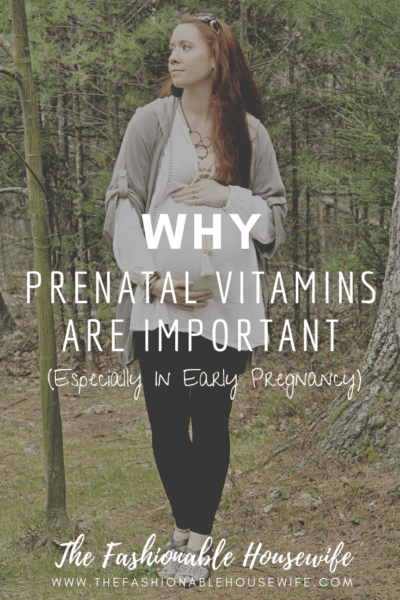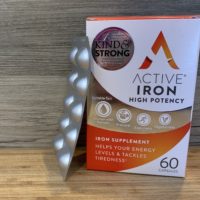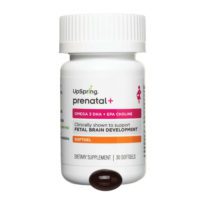
Eating a healthy diet is always recommended for mothers throughout their pregnancy for the nourishment of the unborn baby. Since it may be hard to acquire all the nutrients needed through diet, prenatal vitamins are critical supplements to supply nutrients that serve as building blocks, especially in the first trimester. Some of the nutrients acquired by taking these supplements cannot be acquired by just eating a variety of foods like leafy green vegetables, meat, dairy products, some fruits and legumes.
While taking prenatal vitamins alone won’t guarantee a healthy baby, you can almost think of them as an insurance policy to ensure that pregnant mothers get the right amount of crucial nutrients, especially during early pregnancy. During early pregnancy, the foundations of all the muscular, skeletal, nervous, circulatory, and digestive systems are being established. If there is an important nutrient missing as a building block during this time, it can cause miscarriage result in lifelong consequences. Prenatal vitamins also come in handy for women with dietary restrictions, pregnancy complications, and health issues.
Who Should Take Prenatal Vitamins?
All expecting mothers should take prenatal vitamins unless otherwise advised by their birth professional. Vegan mothers are some of those who should take prenatal vitamins to get any nutrients that they may not get through their diets. Women with lactose intolerance and other food intolerances are also encouraged to take these vitamins. It would also be wise of smoking mothers and those who abuse other drugs substances to quit the habit immediately as those are significant risk factors for spontaneous abortion (miscarriage). If you think you might be pregnant and you need help quitting smoking, or have questions about how to stop taking opioids and other drugs, there are clinics like prccharlotte.com that connect women with resources for a healthy pregnancy.
Mothers with eating disorders and blood disorders also fall under the category of those who would benefit from prenatal vitamins, although they may require a special brand. Those with chronic diseases may also benefit from prenatal vitamins since their diets could be restricted to some foods only. Expectant mothers who have undergone procedures such as gastric bypass surgery should also consider taking these vitamins. It is also essential for mothers carrying multiples such as twins to take prenatal vitamins for supplementing the nutrients acquired through diet.
Nutrients In Prenatal Supplements
Some of the nutrients supplied by these prenatal vitamins can be acquired through diet but in low amounts, hence the need to supplement. The two most essential nutrients that are acquired through prenatal vitamins are iron and folic acid/folate. These are two of the most important supplements to take because most pregnant mothers usually cannot get enough of them through diet alone.
UpSpring Prental Multivitamins are a great choice because they have naturally occurring folate instead of synthetic folic acid, DHA, and choline. You can also find them at your local Target for under $25. They have been my prenatal vitamin of choice for my pregnancy with baby #5.
Shop Prenatals
Iron is Critical Throughout Pregnancy

Most pregnant mothers don’t get enough of this nutrient by what they eat, and therefore fall short of what the body needs especially during the second trimester of pregnancy where the body is increasing the blood volume by 40%. As the days pass, there is an increased demand for iron due to the nourishment of the baby. Lack of this nutrient may cause iron-deficiency anemia. Iron-deficiency anemia increases the risk of low birth weight, preterm delivery, and infant mortality. We recommend finding a prenatal vitamin high in iron or getting Active Iron.
Folic Acid for the First Trimester
Getting the right amounts of this B vitamin just before conception and during the early stage of your pregnancy plays a significant role in the structural development of the baby. Particularly, folic acid is crucial to the development of the baby’s neural tubes (spinal cord) and therefore helps in the prevention of defects such as anencephaly and spina bifida by up to 70%.
Folic acid also prevents health defects such as cleft palate, cleft lip, and heart defects. Getting the right amounts of folic acid may also prevent preeclampsia. There is some controversy on whether the body takes in the synthetic form of folic acid better than the natural form, folate. There are pros and cons for folic acid vs folate, so be sure to do your research before selecting the best prenatal vitamins.

Do Prenatal Vitamins Contain All Nutrients?
Not all nutrients can be supplemented through prenatal vitamins. Some brands may contain several nutrients, but they are often short of other nutrients, which are supposed to be acquired through diet. Of course, water, proteins, fats, and carbohydrates are all things that must be consumed directly as whole foods.
Calcium Supplements in Pregnancy
Most prenatal vitamins may contain calcium in small amount and may not be sufficient for pregnant mothers. Calcium is vital in the development of strong bones and teeth and also plays a significant role in the development of healthy muscles and nerves. Most of these vitamins contain 100 to 200 milligrams of calcium while some contain none. Be sure and ingest enough calcium whether through whole foods or supplements
Fatty Acids for Fetal Development
Some fatty acids are essential to the development of the unborn baby. While these can be acquired through diet, most prenatal vitamins may not contain some of the vital fatty acids such as DHA and EPA which are essential for nerve, brain, and eye tissue development. Since these are crucial for mothers during pregnancy, it is important for them to take foods rich in omega-3s or turn to other supplements.
Vitamin D Levels Throughout Pregnancy
Most prenatal vitamins don’t contain vitamin D, which plays a huge role in the development of strong bones and teeth. It is also essential in the retention of calcium and phosphorous in the body as well as maintaining their levels. Lack of vitamin D may put the baby at the risk of getting rickets, which is associated with fractures and deformities. Most women are deficient in Vitamin D even before pregnancy so it’s a good idea to start supplementing with a quality D3 dose in addition to the prenatal vitamin.
Vitamin D deficiency may lead to pregnancy complications such as gestational diabetes and preeclampsia, not to mention that it can have a negative impact on your baby’s teeth and bones.
When you get your prenatal bloodwork, your doctor or midwife will tell you what your vitamin D levels are and if you should supplement. If your vitamin D levels are below 20, you should ask your midwife if you can take Vitamin D3. While vitamin D levels of 20 are considered “normal”, this is actually lower than most consider to be ideal, so taking a high quality vitamin D supplement is extremely important.
Protein Recommendations for Healthy Pregnancy
It has been shown that consuming 80 -100 grams of protein a day supports the development of the baby and the health of the mother in a substantial way, essentially eliminating the incidence of preeclampsia, preterm birth, and low birth weights. Research the Brewers Diet for more information on recommended meals and what expecting moms should eat.

Expectant mothers are encouraged to take prenatal vitamins as soon as they realize they are pregnant. Some of the nutrients such as folic acid/folate are important during early pregnancy and play a huge role in the development of the baby. Nutrients that are not sufficiently supplied by prenatal vitamins can be acquired through eating the right diet.
Avoid high sugar and carbohydrate meals which can spike blood sugar and lead to a strain on you and your baby’s system. If you fall off your eating goals for the day, don’t get overwhelmed, start back with some quality protein and rich leafy greens the next day. It is better to eat more healthy foods than to deprive yourself and your baby.
Other Articles You Might Like
5 Pieces Of Pregnancy Advice For All Moms To Be
4 Pregnancy Fitness Tips for the Mom to Be





